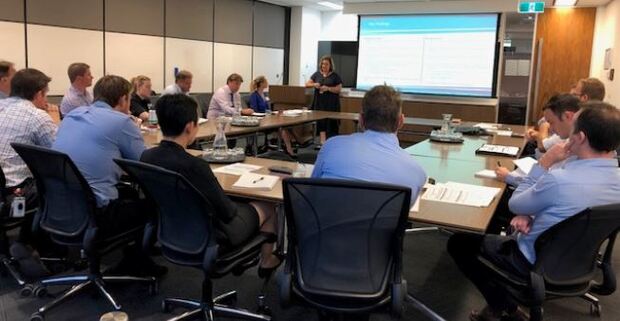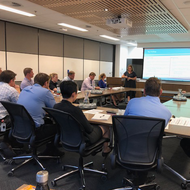Workshops discuss a range of important themes
| Date: | Friday, 29 March 2019 |
|---|
A recent series of workshops helped clarify key areas of the Department of Mines, Industry Regulation and Safety’s (DMIRS) environmental assessment processes.

DMIRS hosted the workshops in February 2019 in partnership with the Chamber of Minerals and Energy (CME) and the Association of Mining and Exploration Companies (AMEC). Attendees included representatives from resource companies, law firms and environmental and title management consultants.
DMIRS’ Acting Resource and Environmental Compliance Executive Director Karen Caple said the workshops covered a range of key themes, including the department’s transparency of reporting on assessment timeframes.
“DMIRS has a regulatory performance target of completing 80 per cent of environment assessments for mining or exploration within 30 business days, which we have been consistently meeting,” Ms Caple said.
“While this is publicly reported and is a useful representation of DMIRS’ efficiency, workshop participants expressed an interest in the department releasing total average processing timeframes.
“The attendees thought this would provide a more practical indication of assessment timeframes to inform project planning.”
The workshops also discussed the department’s Environmental Assessment and Regulatory System (EARS), and the information and status categories the online system provides. Participants requested more information and clearer tracking of their application’s progress. Ideas included providing automatic alerts at key points in the assessment process such as a notification DMIRS had started assessing the application. Other suggested alerts included notification of on-hold events, such as referral to other agencies.
Ms Caple said the workshops further discussed the issue of DMIRS placing applications on hold pending advice from other agencies.
“In 2018, 10 per cent of Programme of Work applications and 31 per cent of all Mining Proposals required advice from other agencies,” Ms Caple said.
“We discussed opportunities to improve our external guidance to industry on the triggers and reasons why applications are referred to other agencies, and opportunities to ensure referrals for advice are operating effectively and efficiently.”
The workshops covered a range of other elements including the quality of industry applications, length of time applications are waiting for assessment within the department, and the consistency of assessment processes between legislative frameworks and regulatory agencies.
“The workshops were a great opportunity for industry to provide feedback on our environmental assessment practices, and the sessions identified a number of opportunities for DMIRS to provide further guidance to applicants, in addition to improvements that industry could undertake itself” Ms Caple said.

